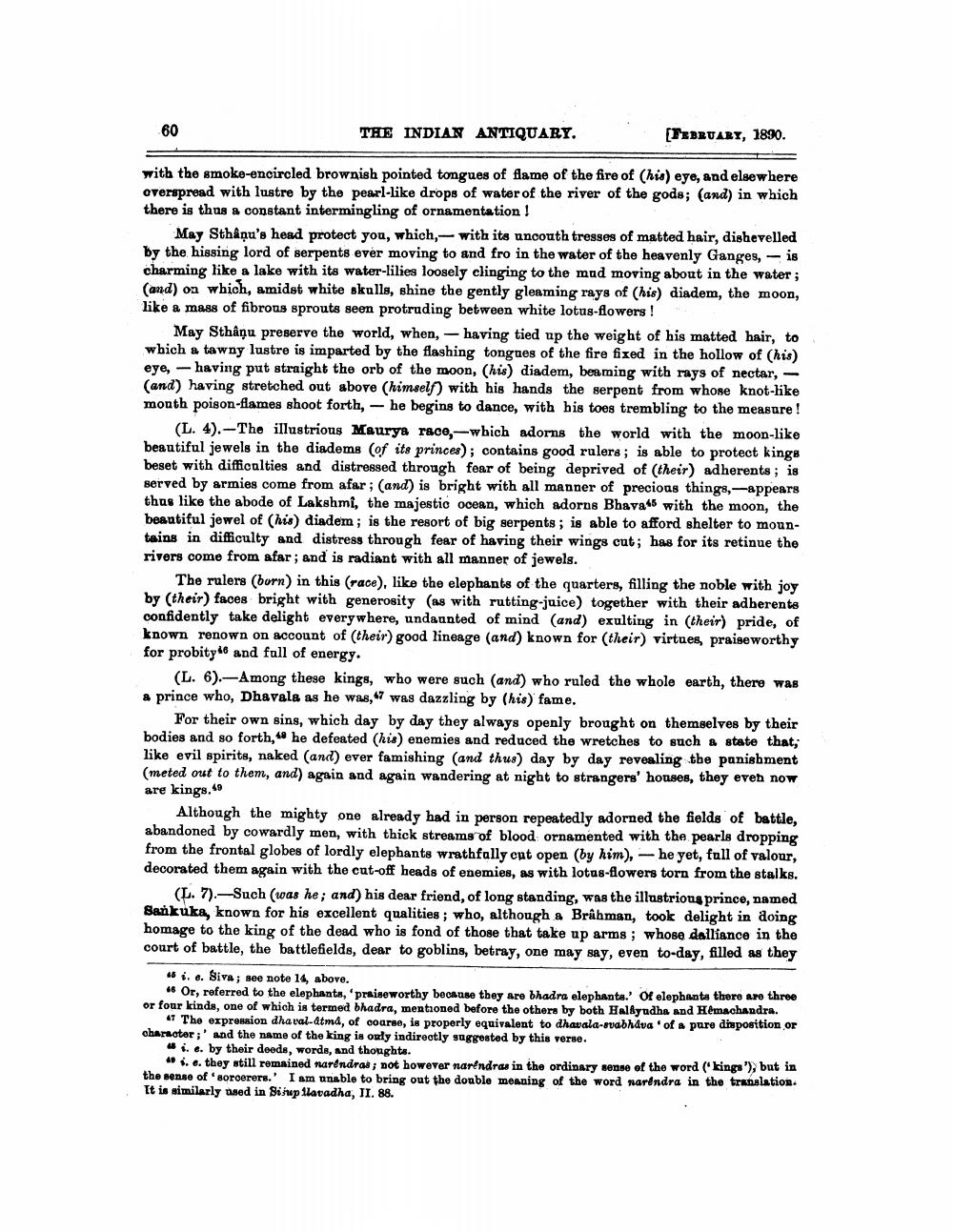________________
60
THE INDIAN ANTIQUARY.
(PEBRUARY, 1890.
with the smoke-encircled brownish pointed tongues of fame of the fire of (his) eye, and elsewhere cverspread with lustre by the pearl-like drops of water of the river of the gods; (and) in which there is thus a constant intermingling of ornamentation !
May Sthâņu's head protect you, which, - with its uncouth tresses of matted hair, dishevelled by the hissing lord of serpents ever moving to and fro in the water of the heavenly Ganges, is charming like a lake with its water-lilies loosely clinging to the mud moving about in the water; (and) on which, amidst white skulls, shine the gently gleaming rays of (his) diadem, the moon, like a mass of fibrous sprouts seen protruding between white lotus-flowers !
May Sthâņu preserve the world, when, - having tied up the weight of his matted hair, to which a tawny lustre is imparted by the flashing tongues of the fire fixed in the hollow of (his) eye, - having put straight the orb of the moon, (his) diadem, beaming with rays of nectar, - (and) having stretched out above (himself) with his hands the serpent from whose knot-like month poison-flames shoot forth, - he begins to dance, with his toes trembling to the measure !
(L. 4).-The illustrious Maurya race, which adorns the world with the moon-like beautiful jewels in the diadems (of its princes); contains good rulers; is able to protect kings beset with difficulties and distressed through fear of being deprived of (their) adherents ; is served by armies come from afar; (and) is bright with all manner of precious things, -appears thus like the abode of Lakshmi, the majestic ocean, which adorns Bhava" with the moon, the beautiful jewel of (his) diadem; is the resort of big serpents; is able to afford shelter to mountains in difficulty and distress through fear of having their wings cut; has for its retinue the rivers come from afar; and is radiant with all manner of jewels.
The rulers (burn) in this (race), like the elephants of the quarters, filling the noble with joy by (their) faces bright with generosity (as with rutting-juice) together with their adherents confidently take delight everywhere, undaunted of mind (and) exulting in (their) pride, of known renown on account of (their) good lineage (and) known for (their) virtues, praiseworthy for probity and full of energy.
(L. 6).-Among these kings, who were such (and) who ruled the whole earth, there was a prince who, Dhavals as he was, was dazzling by (his) fame.
For their own sins, which day by day they always openly brought on themselves by their bodies and so forth, he defeated (his) enemies and reduced the wretches to such a state that; like evil spirits, naked (and) ever famishing (and thus) day by day revealing the panishment (meted out to them, and) again and again wandering at night to strangers' houses, they even now are kings.69
Although the mighty one already had in person repeatedly adorned the fields of battle, abandoned by cowardly mon, with thick streams of blood ornamented with the pearls dropping from the frontal globes of lordly elephants wrathfally cut open (by him), -heyet, full of valour, decorated them again with the cut-off heads of enemies, as with lotus-flowers torn from the stalks.
(L. 7).-Such (was he; and) his dear friend, of long standing, was the illustrious prince, named Sankuks, known for his excellent qualities; who, although a Brâhman, took delight in doing homage to the king of the dead who is fond of those that take up arms; whose dalliance in the court of battle, the battlefields, dear to goblins, betray, one may say, even to-day, filled as they
45 6. e. Siva; see note 14, above.
+6 Or, referred to the elephants, praiseworthy because they are bhadra elephants.' Of elephants there are three or four kinds, one of which is termed bhadra, mentioned before the others by both Hallyudha and Hemachandra.
47 The expression dhaval-atma, of course, is properly equivalent to dhavala-svabhava of a pure disposition or character;' and the name of the king is only indirectly suggested by this verse.
1. e. by their deeds, words, and thoughts. * 6. e. they still remained narandras; not however narendras in the ordinary sense of the word "kings'), but in the sense of soroerers.' I am unable to bring out the double meaning of the word narendra in the translation. It is similarly wed in Sifup llavadha, II. 88.




